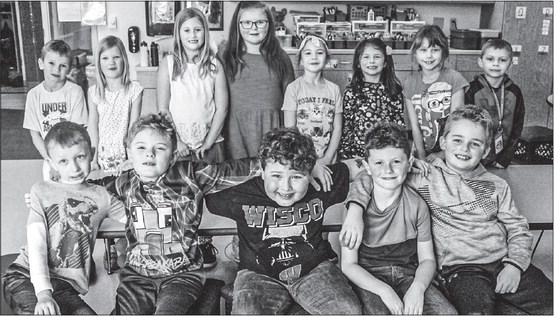Edgar school referendum


DECISION 2022
$950,000 plan would pay for staff, maintenance
A proposed five-year, non-recurring $950,000 revenue cap referendum will enhance learning at Edgar Public Schools while still allowing school taxes to significantly drop through 2027, according to school officials and community supporters. District residents will vote on the proposal at the April 5 spring election.
District bookkeeper Morgan Mueller said the referendum, if approved, will plug a district $340,000 annual budget deficit hole, while, at the same time, increasing spending by $610,000 a year. This sum calculates to approximately eight percent of the district’s $8 million budget. The added spending, she said, will restore the district’s $100,000 maintenance budget, as well as a business education teacher and several elementary school staff cut over the past few years.
Taxpayers will be able to afford the package, Mueller said, because the district in 2024 will pay off a $6.62 million facility remodeling project approved by voters in 2011.
Currently, she said, Edgar residents pay about $1 million a year for principal and interest on the facilities loan. When those payments disappear in two years, the bookkeeper said, taxpayers, instead, will pay a similar amount each year for the referendum.
Mueller said the district’s current property tax rate of $9.46 this year will likely fall to $7.28 by 2026-27 with an approved referendum. This forecasted rate, the bookkeeper said, assumes no major changes in state aid.
“That’s going to be the new normal, given status quo funding for the state,” she said.
This projection can be applied to a $150,000 home. The house, which now pays $1,419 in school taxes, will pay $1,179 in school taxes in 2027. The sum is $240 or 17 percent less than the current taxes.
The calculation assumes today’s $150,000 home will gain two percent in value each year and have a taxable value of $162,000 in 2027.
Add a teacher
Edgar High School vocational-agriculture instructor Matt Reinders said restoring a business education program will have ripple effects through the high school.
The instructor said he and family and consumer education teacher Kris Federwitz started teaching business classes after the high school’s business education program was ended due to budget reasons.
The effect, he said, has been that enrollments in both his agriculture classes and Federwitz’s culinary arts classes have been higher than ideal.
“I teach a welding class with 23 students but I only have 21 welding helmets,” he said. Reinders said the school scrapped a computer lab when it ended its business education program. This is a problem, he said, because, although all students have Chromebooks, they need a lab with PCs to learn how to use Microsoft products that are customary in industry.
Reinders said that if a business education program is re-established, he will be able to teach more sections of agriculture with fewer students per class and add a course or two. Federwitz, he said, will have the same opportunities to enhance electives.
Reinders said he would likely propose an advanced welding class and a diesel mechanics class in collaboration with Northcentral Technical College should a referendum be approved.
The instructor said a local business education teacher would reduce the number of Edgar students taking courses, such as accounting, on-line, while giving the school’s Future Business Leaders of America (FBLA) club a shot in the arm.
“This would be an opportunity to build another co-curricular,” he said.
Community support
Greg Kornack, Edgar, a member of the Edgar School District referendum advisory committee, said the referendum is needed to keep Edgar Public Schools strong and the village of Edgar on the map.
“If you try and run without a viable school, a community like Edgar will dry up and blow away,” he said. “Look at the towns that have lost schools due to consolidation. The towns fall apart. There is nothing left in 10 years.”
He said young families won’t move to a community without a school and, without growth, the local tax base starts to erode.
“It’s just a snowball effect,” he said. Kornack said Tripoli and Gleason are examples of municipalities that have suffered after losing their local public schools.
The committee member said the school listened to the community and changed the referendum from a recurring to a five-year non-recurring referendum. This means the referendum is only good for five years. Voters will be asked to approve funding five years from now.
Kornack said he supports the referendum because, in the final analysis, he supports the village of Edgar.
“If anything, I’m pro-Edgar,” he said.
